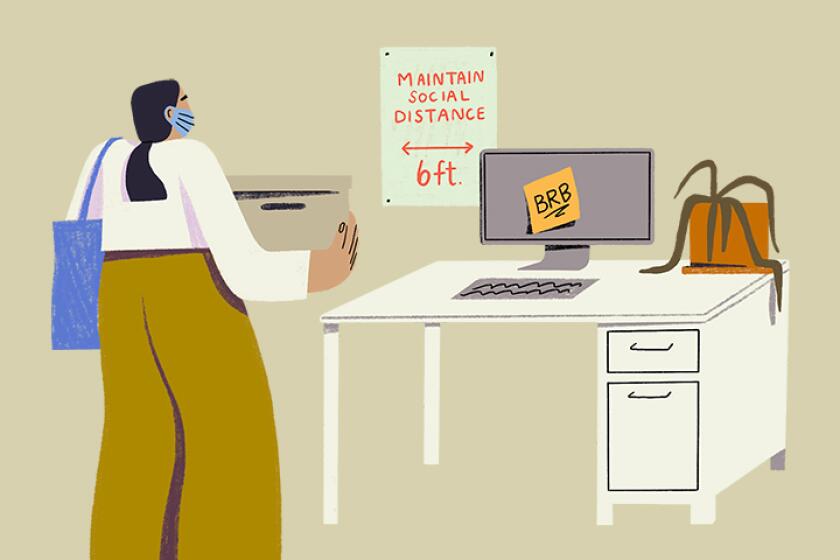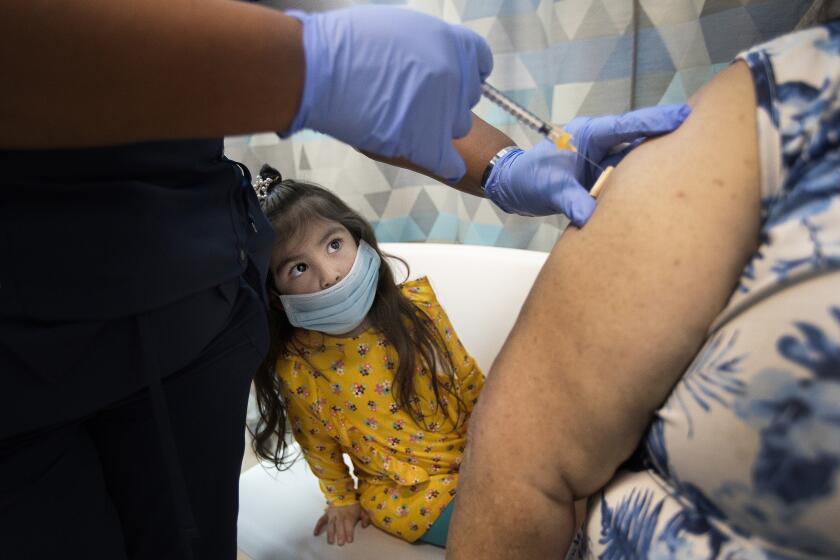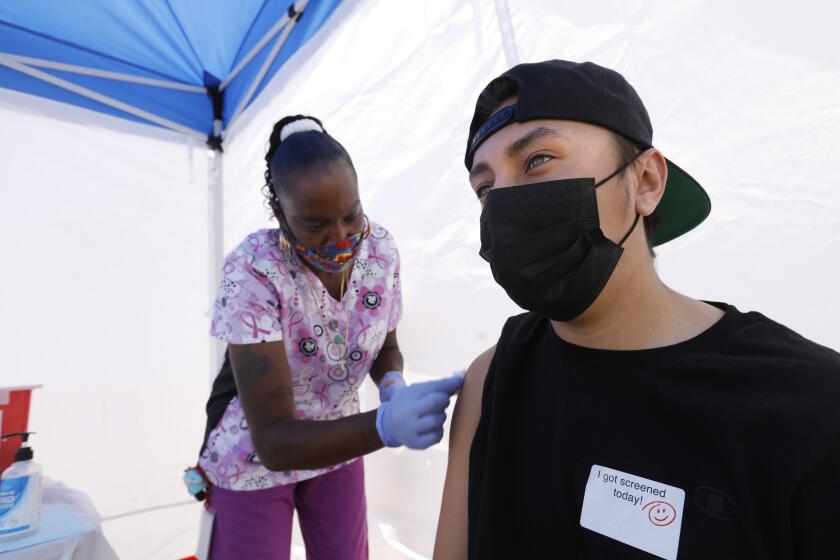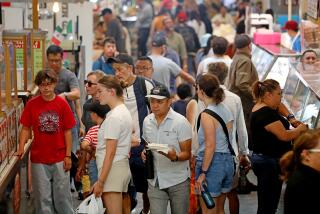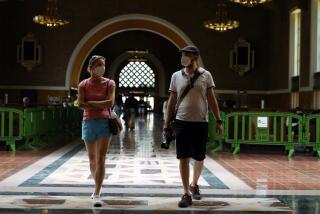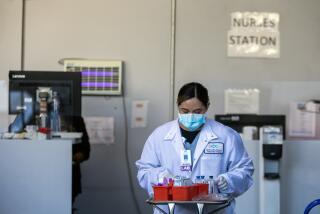California postpones decision on relaxing mask and distancing rules for workers
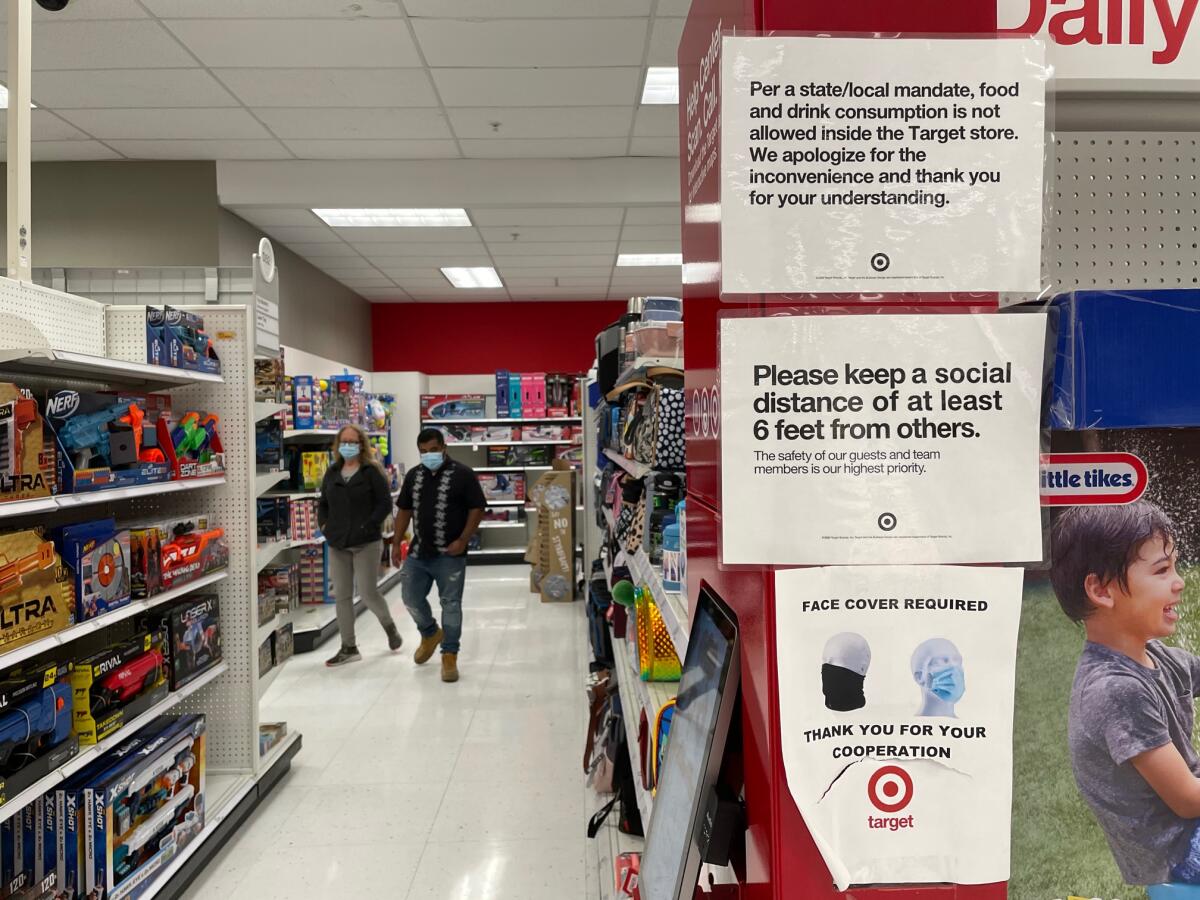
- Share via
A California workplace safety board postponed a vote Thursday on a proposal that would have allowed workers to return to their jobs without social distancing or face masks so long as everyone in a room is vaccinated.
As a result, workers must continue to wear masks and practice physical distancing for now, unless they’re alone — either in a room or outside. Workers can remove masks when eating or drinking but must be physically distant from others.
The delay came after the deputy chief of the California Division of Occupational Safety and Health, known as Cal/OSHA, wrote a memo asking the seven-member Occupational Safety and Health Standards Board to “not vote to approve the current proposal.”
The request followed this week’s announcement that California would broadly loosen its mask rules in nonworkplace settings effective June 15, allowing everyone who is vaccinated to remain maskless in most indoor and outdoor settings, while still requiring unvaccinated or partially vaccinated people to keep wearing masks in most settings when near other people.
Some of us are hoping that a year of remote work will lead to greater job flexibility. Others can’t wait to get out of the house.
In light of those changes, Cal/OSHA asked the board to “instead allow us to present a new proposal at a future meeting,” wrote Eric Berg, deputy chief of Cal/OSHA.
The board will next meet June 3 to vote on new language that will be proposed by Cal/OSHA. A revised proposal would have to be posted for public review no later than May 28, officials said.
Although they didn’t take any official action, a few board members expressed reservations about rolling back restrictions too far — even though the U.S. Centers for Disease Control and Prevention has already relaxed its recommendations.
“I don’t think it’s the time to roll back protections. I think the CDC guidance on May 13 was a bit premature,” board member Barbara Burgel said.
Burgel, echoing some of the concerns raised during a lengthy public comment period that preceded the postponement, said she was concerned with the potential of creating “a two-class system of vaccinated versus unvaccinated.”
“And it shifts the responsibility to individual employees to try and sort out, ‘How are we going to know if our coworkers are vaccinated? How do we know if vaccinated individuals have symptoms?’” said Burgel, who is an independent occupational health consultant and a professor emeritus at the UC San Francisco School of Nursing.
But board member Chris Laszcz-Davis said she thinks it is important to recognize that “the risk in California today, in 2021, is not what it was in 2020.”
“I don’t think we can roll everything back, I think we need to continue to have some COVID requirements in place because the crisis isn’t over,” said Laszcz-Davis, who has experience as a corporate executive and previously worked at Lawrence Livermore National Laboratories as an industrial hygiene engineer. “But I think we need to recognize that it’s been mitigated to some extent.”
Board chair David Thomas said he thinks the state should send a message that California will soon emerge from the pandemic.
“Our message should be: We’re getting to the end of this. Hopefully we’re getting to a place where we can open things up,” Thomas said.
Still, he said he wants to make sure that the state doesn’t bungle the reopening: “We just don’t want to get — for lack of a better word — we don’t want to get stupid.”
The office beckons. What rights and protections do you have? Will safety and vaccine issues in the workplace prompt lawsuits?
The changes that had been up for review Thursday included no longer mandating physical distancing at locations where all employees are fully vaccinated and scrapping a requirement for workers to wear masks when everyone in a room is fully vaccinated and none have COVID-19 symptoms.
The easing of masking and physical distancing rules would not have applied to workers exposed to potentially unvaccinated non-employees, nor would they have necessarily meant customers could go mask-free when entering businesses.
Health officials have long held physical distancing and proper masking as twin weapons in the fight against COVID-19 — helping keep people from inadvertently sharing the respiratory droplets and particles that carry the coronavirus.
Regardless of what the board ultimately opts to do, state officials have foreshadowed an even more drastic relaxation, saying they hope to fully reopen California’s economy June 15. That day, the state will align with recent guidance from the CDC and allow fully vaccinated Californians to ditch their masks in most indoor settings outside of workplaces.
As more people get vaccinated for COVID, California considers lifting safety regulations at workplaces where everyone’s had shots.
During public comment, Vivi Le, a worker organizer with the Los Angeles Alliance for a New Economy, said that she worried employers would do a poor job of tracking vaccination records, and that workers who haven’t been vaccinated would break the rules and work without a mask.
Le said many lower income workers and people of color still haven’t been vaccinated.
“Taking away these mask requirements — proposing using vaccination as a good replacement — is too fast, too soon. Maybe one day, but not right now,” Le said.
Len Welsh, who was representing hotel and other groups, urged that rules be changed soon to reflect the effectiveness of COVID-19 vaccines.
“Vaccinations are changing the landscape and we have to include provisions that let employers respond to the fact that they have a fully or mostly vaccinated workforce,” Welsh said.
Fully vaccinated people are highly protected from the coronavirus, even when in close contact with unvaccinated people, many experts say. In the rare instance that a vaccinated person gets infected anyway, chances are they will either show no symptoms or have very mild symptoms, and they are unlikely to transmit the virus to other people.
Some experts have said it was prudent of California to wait a bit longer until more people get vaccinated before easing mask requirements.
One reason for vaccinated people to continue masking up for a few more weeks — until case rates come down even further — is to avoid becoming the rare vaccinated person who still gets infected with the coronavirus and suffers from complications.
“I still don’t want to get COVID if I can avoid it,” tweeted Dr. Robert Wachter, chair of UC San Francisco’s Department of Medicine. “We can’t say for sure yet if mild COVID in a vaccinated person can lead to long COVID,” which can keep people sick for months.
As of May 10, 1,136 cases of a fully vaccinated person being hospitalized with coronavirus-related illness had been reported to the CDC, along with 223 deaths. However, federal health officials said 30% of those hospitalizations, and 18% of fatalities, were “reported as asymptomatic or not related to COVID-19.”
By comparison, more than 115 million Americans had been fully vaccinated as of that date.
In California, more than two-thirds of adults are now at least partially vaccinated for COVID-19 — a promising milestone, though much work remains, officials say.
With some adults hesitant to get a COVID-19 shots, opening the vaccine to younger teens could help get immunity numbers up.
Officials credit that vaccine coverage with helping drive down California’s coronavirus case rates, which remain among the lowest in the nation.
Over the last week, the state has reported an average of 1,349 cases per day — down 21% from two weeks ago.
That’s not to say the danger has entirely passed, however.
From March 1 through April 19, Cal/OSHA received 336 COVID-19 complaints and 107 reports of COVID-19 illnesses, 27 of them fatal, “despite the large number of vaccinations administered during that period,” agenda documents state.
More to Read
Sign up for Essential California
The most important California stories and recommendations in your inbox every morning.
You may occasionally receive promotional content from the Los Angeles Times.
